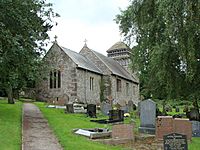St David's Church, Llanddewi Rhydderch facts for kids
Quick facts for kids Church of St David |
|
|---|---|

"a medieval church sensitively restored"
|
|
| Lua error in Module:Location_map at line 420: attempt to index field 'wikibase' (a nil value). | |
| Location | Llanddewi Rhydderch, Monmouthshire |
| Country | Wales |
| Denomination | Church in Wales |
| History | |
| Status | parish church |
| Founded | early 14th century |
| Architecture | |
| Functional status | Active |
| Heritage designation | Grade II* |
| Designated | 9 January 1956 |
| Architectural type | Church |
| Administration | |
| Parish | Llanddewi Rhydderch |
| Deanery | Abergavenny |
| Archdeaconry | Monmouth |
| Diocese | Monmouth |
The Church of St David is an old church in a place called Llanddewi Rhydderch, in Monmouthshire, Wales. It's a special building that has been around for a very long time. Some parts of the church, like the bottom of its tower, might be from the 12th century. Most of the church you see today was built in the 1300s and 1400s. It was carefully fixed up in the 1860s by an architect named John Pollard Seddon. This church is still used for services today.
Contents
History of the Church
The Church of St David has very old roots, going back to the Normans who came to Britain. The base of the church's tower and some of its narrow, tall windows, called lancet windows, seem to be from that early time. The main part of the church was built later, during the 14th and 15th centuries.
Victorian Restoration
In 1862 and 1863, a skilled architect named J. P. Seddon worked on the church. He did a careful restoration, which means he repaired and updated the building while keeping its original style. Not many changes have been made since then. The church is still an active part of the Llanddewi Rhydderch community.
Architecture and Design
The Church of St David is built from a type of stone called Old Red Sandstone. The building has several main parts. These include the nave (the main area where people sit), the chancel (the area near the altar), a porch, and a tower.
Tower Features
The tower has a unique "pyramidal cap." This is a pointed roof shape that is common in the Welsh Marches, which is the border area between Wales and England.
Special Status
The Church of St David is a Grade II* listed building. This means it's a very important historical building. Its official record describes it as a "medieval church sensitively restored," showing how well it has been preserved over the centuries.

